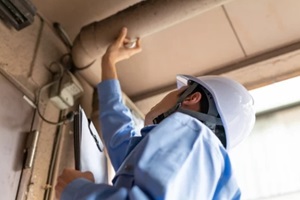As Legionnaires’ disease cases continue to rise in New Jersey, a new law, NJ 2188, is set to transform how buildings manage their water systems. Taking effect this past September 2024, this legislation introduces crucial requirements for facility managers and building operators. Here’s your comprehensive guide to understanding and preparing for these changes.
The New Law’s Reach
 This groundbreaking legislation affects a wide range of properties and water systems across New Jersey. Healthcare facilities, including hospitals and nursing homes, must implement comprehensive water management programs for all water systems. Buildings with cooling towers, whirlpool spas, swimming pools, or decorative fountains require specialized chemical treatment and monitoring programs to prevent Legionella growth in these high-risk systems. Residential high-rises with six or more floors using centralized water heaters must comply, as do hotels and motels with 25 or more units. The law extends to senior living communities and residential buildings serving disabled populations with 25 or more units, protecting these vulnerable residents through careful management of their water systems. Correctional facilities with centralized hot water systems also fall under these requirements, and any building previously associated with a Legionnaires’ disease outbreak automatically requires compliance, regardless of size or type.
This groundbreaking legislation affects a wide range of properties and water systems across New Jersey. Healthcare facilities, including hospitals and nursing homes, must implement comprehensive water management programs for all water systems. Buildings with cooling towers, whirlpool spas, swimming pools, or decorative fountains require specialized chemical treatment and monitoring programs to prevent Legionella growth in these high-risk systems. Residential high-rises with six or more floors using centralized water heaters must comply, as do hotels and motels with 25 or more units. The law extends to senior living communities and residential buildings serving disabled populations with 25 or more units, protecting these vulnerable residents through careful management of their water systems. Correctional facilities with centralized hot water systems also fall under these requirements, and any building previously associated with a Legionnaires’ disease outbreak automatically requires compliance, regardless of size or type.
Development and Implementation Timeline
Building managers have 24 months to develop comprehensive water management programs. This isn’t just about paperwork – it’s about creating a robust framework for water safety that will protect occupants for years to come. Following program development, facilities have an additional three months – bringing the total to 27 months – to fully implement their water management programs. This strategic timeline allows for thorough preparation while maintaining urgency.
Understanding New Requirements
Water Management Fundamentals
These aren’t your standard maintenance protocols. The new law demands comprehensive water management programs that seamlessly integrate with Department of Health recommendations. These programs must align with ASHRAE 188 standards, setting a high bar for water safety. Specific testing for Legionella pneumophila isn’t just recommended – it’s required. Additionally, facilities must notify the public when implementing these programs, ensuring transparency and accountability.
Rules and Consequences
The stakes are high under the new legislation. The Department of Health will actively investigate each reported case, leaving no stone unturned. Facilities found non-compliant face substantial penalties – up to $10,000 in fines. Consistent monitoring and detailed documentation aren’t just good practices; they’re essential safeguards against potential violations.
Your Path Forward
 The journey to compliance begins with a comprehensive evaluation of your current practices and protocols. Facility managers must start by conducting a thorough assessment of existing water management practices against the new requirements. This critical first step reveals gaps in your current program and helps establish priorities for moving forward.
The journey to compliance begins with a comprehensive evaluation of your current practices and protocols. Facility managers must start by conducting a thorough assessment of existing water management practices against the new requirements. This critical first step reveals gaps in your current program and helps establish priorities for moving forward.
Creating an effective water management program requires more than just meeting minimum standards. Your program should not only align with ASHRAE 188 standards but exceed them, establishing a water management plan that ensures long-term water safety and system efficiency. This means developing detailed protocols, establishing clear responsibilities, and creating comprehensive management strategies that address every aspect of your water systems.
Success in this endeavor requires multiple layers of ongoing attention and expertise. Professional water treatment partners provide essential knowledge and specialized experience, helping ensure your program achieves both compliance and effectiveness. Regular testing and monitoring protocols keep your systems running at peak performance, while detailed documentation practices create a clear trail of your compliance efforts. Every maintenance activity, test result, and system modification must be meticulously recorded, creating a comprehensive history that protects both your facility and its occupants.
Professional Water Treatment Matters
Modern water treatment isn’t just about adding chemicals – it’s about implementing sophisticated, comprehensive solutions. Professional water treatment services bring expertise in developing customized water management programs tailored to your facility’s unique needs. Regular water quality testing ensures early detection of potential issues, while ASSE-certified Legionella prevention services provide peace of mind. From chemical treatment solutions to maintenance and cleaning, these services ensure your facility stays ahead of compliance requirements through ongoing monitoring and support.
The Early Action Advantage
 Why wait until the deadline looms? Early adopters gain significant advantages in this new regulatory landscape. Beyond simply reducing the risk of Legionnaires’ disease outbreaks, proactive facilities position themselves ahead of compliance deadlines. This forward-thinking approach improves building safety and efficiency while potentially reducing costs through strategic management. Perhaps most importantly, early adoption enhances your reputation among tenants and stakeholders, demonstrating your commitment to their safety and well-being.
Why wait until the deadline looms? Early adopters gain significant advantages in this new regulatory landscape. Beyond simply reducing the risk of Legionnaires’ disease outbreaks, proactive facilities position themselves ahead of compliance deadlines. This forward-thinking approach improves building safety and efficiency while potentially reducing costs through strategic management. Perhaps most importantly, early adoption enhances your reputation among tenants and stakeholders, demonstrating your commitment to their safety and well-being.
Steps to Take Now
The time for action is now. Begin by thoroughly reviewing your current water management practices. Consult with water treatment experts who understand the nuances of these new requirements. Start developing your water management program with a clear vision of implementation within the required timeline. Consider early adoption to ensure you’re fully prepared when the deadlines arrive.
Leading the Change
The recently approved New Jersey Legionella law marks a critical shift in water system management, and local expertise matters more than ever. As a New Jersey-based company with 35 years of experience, Tower Water understands the unique challenges of our region’s water systems and the importance of protecting our densely populated communities. Our deep roots in the area mean we intimately understand the local water characteristics and the specific needs of various industries we serve.
Having successfully guided countless New York City facilities through Local Law 77’s stringent requirements, we bring proven compliance expertise to New Jersey’s new legislation. We’ve developed proven comprehensive solutions that meet and exceed regulatory requirements. This combination of local knowledge and regulatory expertise positions us perfectly to help New Jersey facilities navigate these new requirements effectively.
Ready to ensure your facility’s compliance with New Jersey’s new Legionella law? Contact Tower Water today to schedule a consultation and discover how our local expertise can protect your building and its occupants. Contact us for a free consultation or call us toll-free at (888) 539-1559 to speak with our team of experts.
